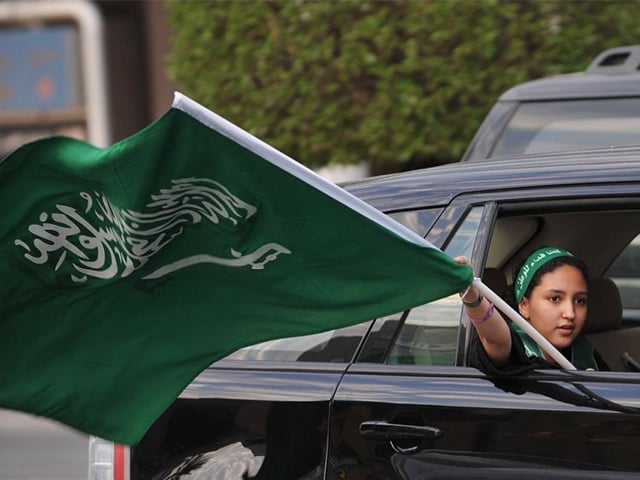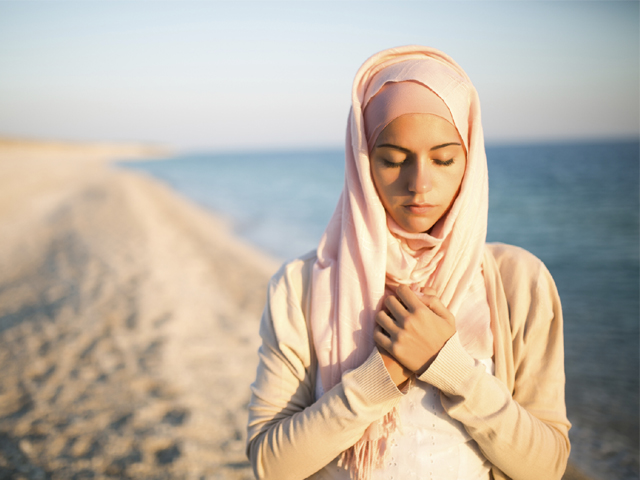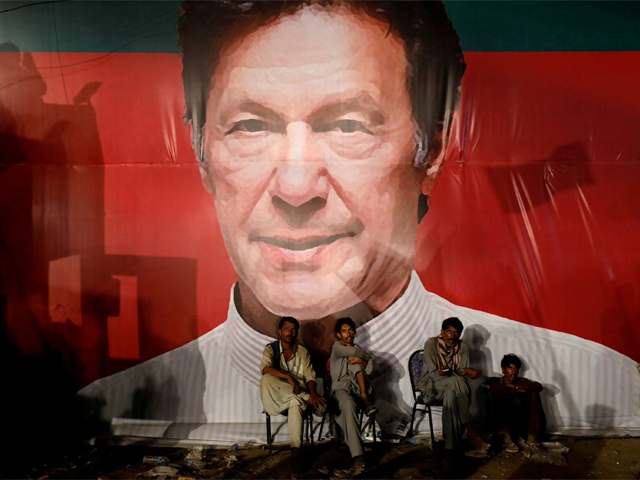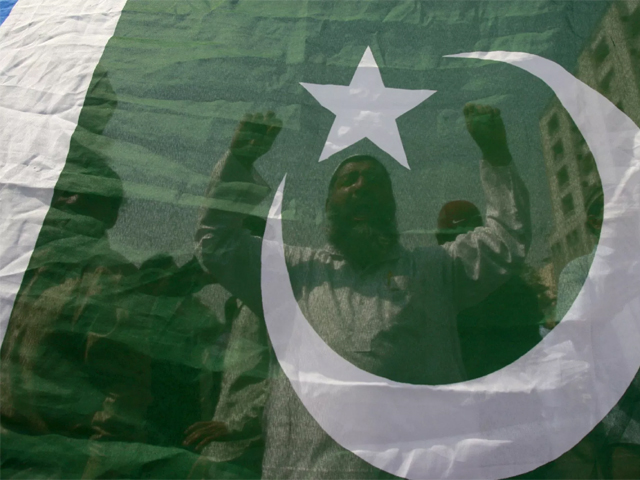
A Saudi girl waves a national flag during celebrations of the 81st Saudi Arabian National Day in the desert kingdoms capital Riyadh on September 23, 2011. PHOTO: AFP
A ‘progressive’ Saudi Arabia that practises moderate Islam – possibility or a sham?
This shift towards moderate Islam will be radical & won't bode well with the conservative propensities of its people.
Is Saudi Arabia turning over a new leaf, or are these new policies just an anomaly; perhaps a misdirected confidence of an individual who is trying to change the society in his own image? Only time will tell.
The recently appointed crown prince of Saudi Arabia, Prince Muhammad Bin Salman (MBS), has embarked on an impressive but debatable development plan for the oil-rich country. This plan will see Saudi radically transform from its archaic system of governance and develop an over-the-top modern, high tech city which, according to MBS, is
“The first capitalist city in the world… this is the unique thing that will be revolutionary.”
This effort, once completed, would not only rival the modern cities in the West, but also put them to shame. Along with that came his assertion that he wanted to take Saudi Arabia back towards “moderate Islam”.
It is interesting to note that this shift towards ‘moderate Islam’ will be ‘radical’ in nature. What makes this hope of an overnight renovation questionable is that, without addressing the underlying issues the Saudis are confronted with, any attempt towards such a drastic change will be an exercise in futility. Let us discuss some glaring flaws in the current approach.
At the outset, it must be understood that Saudi Arabia is a hard-core conservative state, where religion plays a pivotal role in the everyday lives of the populace. Even otherwise, this “land of the two mosques” is the location of two of the holiest cities in Islam – Makkah and Madina. Therefore, it is only natural that religion is entrenched in the very fabric of their society.
For such an ideologically-moulded nation, any type of change requires time – to understand what these changes would entail, to grasp its overall effects, and then finally, for most of the members of society to accept it. A sudden and rapid transformation, as is being contemplated by MBS, will probably not bode well with the conservative propensities of the Saudi people.
History is filled with examples of nations that suffered because they were driven into unchartered waters on the whims of a few individuals. Take Iran, for example. Almost half a century after the Shah was overthrown, their society remains fractured, with many families leaving the country because they could not reconcile with the abrupt change from ultra-liberal to extremely conservative.
Similarly, when Ziaul Haq, in his lust for political “ratings”, decided to make Pakistan more religious, he committed a grave and irreversible injustice towards our society. That short-sighted action on his part destroyed the very ethos of our nation and led to the breeding and proliferation of an extremist ideology, which has to date cost us thousands of innocent lives.
However, that is not to imply that problems only arise when the sudden switch is from moderation towards conservatism. The reverse is equally damaging. To take another occasion from our chequered history, when General Pervez Musharraf introduced the principle of moderate enlightenment as a counter to Zia’s Islamisation program, instead of having meaningful impact on our culture, it further deepened the societal fault lines between the rich and the poor.
The common theme that arises from the aforementioned examples is that when norms of representative governance – such as elections, campaigning, voting, parliamentary debates and free and fair media – are substantively absent from a society, an arbitrary system of administering a country can never succeed.
Apart from the governance perspective, recent political developments also cast shadows of doubt over the objectives of the young Saudi prince. Many eyebrows were raised on the timing of the prince’s modernisation plans, which came to the fore after his meeting with US President Donald Trump. It seems that both sides reached a covert agreement, with America apparently keen on helping Saudi Arabia enter into a new era of development and modernisation, in return for millions of Saudi oil dollars and greater opportunities for numerous American companies.
But for America to embark on this expansive venture, it needed assurances that the Saudis would let go of their extremist affinities and help the US in combating terrorism in the region. That is where the enforced isolation upon Qatar comes into play and the puzzle pieces start fitting in place.
It seems ironic that Qatar, an introverted nation that hardly wields much influence in international affairs, is being blamed and sanctioned by the Gulf States, when it is Saudi Arabia that has been funding and spreading the fanatical brand of Wahhabi Islam throughout the Muslim world. The proxy wars that Saudi Arabia has been waging against Iran for decades are an open secret that the entire world is cognisant of.
It is also important to note that this radical push towards moderation at the behest of America has caused considerable discord in the House of Saud, with some members expressing their disagreement at the direction spearheaded by the new prince. The Saud family established itself on the back of a conventional, conservative agenda that has suited them very well thus far. They understood the pulse of their people and consolidated power. MBS’s contemporary predispositions may lead to the ultimate downfall of a family that has ruled over the Kingdom since its establishment in 1932.
In conclusion, casting all doubts aside, if the young prince is indeed sincere in his resolve to revolutionise the Kingdom, he must look beyond new cities, skyscrapers, and paved roads; the real challenge is to ensure that a meaningful change is first brought within. This can be done by developing democratic institutions in the society, by allowing Saudi women an equal space in public life beyond just the cosmetic right to drive, by tolerating and appreciating dissenting voices, and, most importantly, by retracting the Kingdom from all its sectarian proxy battles with Iran.
Only then will the Saudis, and the world at large, take the lofty claims of the prince with earnest seriousness.




COMMENTS (6)
Comments are moderated and generally will be posted if they are on-topic and not abusive.
For more information, please see our Comments FAQ